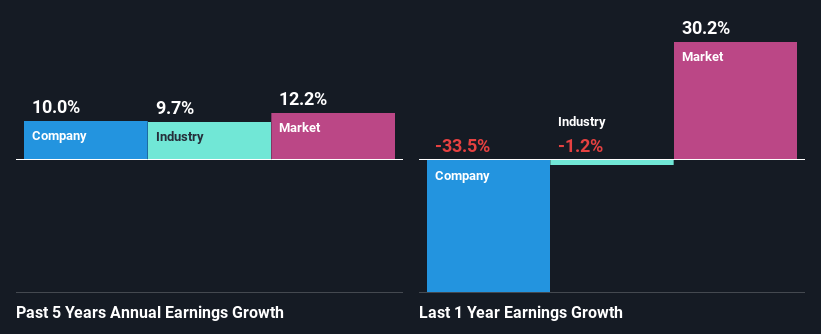Essex Property Trust, Inc.'s (NYSE:ESS) Stock On An Uptrend: Could Fundamentals Be Driving The Momentum?
Essex Property Trust's (NYSE:ESS) stock is up by a considerable 14% over the past three months. As most would know, fundamentals are what usually guide market price movements over the long-term, so we decided to look at the company's key financial indicators today to determine if they have any role to play in the recent price movement. In this article, we decided to focus on Essex Property Trust's ROE.
ROE or return on equity is a useful tool to assess how effectively a company can generate returns on the investment it received from its shareholders. In other words, it is a profitability ratio which measures the rate of return on the capital provided by the company's shareholders.
Check out our latest analysis for Essex Property Trust
How Do You Calculate Return On Equity?
The formula for return on equity is:
Return on Equity = Net Profit (from continuing operations) ÷ Shareholders' Equity
So, based on the above formula, the ROE for Essex Property Trust is:
7.2% = US$448m ÷ US$6.2b (Based on the trailing twelve months to March 2021).
The 'return' is the amount earned after tax over the last twelve months. Another way to think of that is that for every $1 worth of equity, the company was able to earn $0.07 in profit.
What Is The Relationship Between ROE And Earnings Growth?
We have already established that ROE serves as an efficient profit-generating gauge for a company's future earnings. Depending on how much of these profits the company reinvests or "retains", and how effectively it does so, we are then able to assess a company’s earnings growth potential. Generally speaking, other things being equal, firms with a high return on equity and profit retention, have a higher growth rate than firms that don’t share these attributes.
A Side By Side comparison of Essex Property Trust's Earnings Growth And 7.2% ROE
On the face of it, Essex Property Trust's ROE is not much to talk about. However, the fact that the company's ROE is higher than the average industry ROE of 5.1%, is definitely interesting. Consequently, this likely laid the ground for the decent growth of 10% seen over the past five years by Essex Property Trust. Bear in mind, the company does have a moderately low ROE. It is just that the industry ROE is lower. Hence there might be some other aspects that are causing earnings to grow. E.g the company has a low payout ratio or could belong to a high growth industry.
We then performed a comparison between Essex Property Trust's net income growth with the industry, which revealed that the company's growth is similar to the average industry growth of 9.7% in the same period.
The basis for attaching value to a company is, to a great extent, tied to its earnings growth. It’s important for an investor to know whether the market has priced in the company's expected earnings growth (or decline). Doing so will help them establish if the stock's future looks promising or ominous. Is ESS fairly valued? This infographic on the company's intrinsic value has everything you need to know.
Is Essex Property Trust Efficiently Re-investing Its Profits?
Essex Property Trust has a high three-year median payout ratio of 56%. This means that it has only 44% of its income left to reinvest into its business. However, it's not unusual to see a REIT with such a high payout ratio mainly due to statutory requirements. In spite of this, the company was able to grow its earnings by a fair bit, as we saw above.
Besides, Essex Property Trust has been paying dividends for at least ten years or more. This shows that the company is committed to sharing profits with its shareholders. Our latest analyst data shows that the future payout ratio of the company over the next three years is expected to be approximately 64%. Therefore, the company's future ROE is also not expected to change by much with analysts predicting an ROE of 6.8%.
Summary
In total, it does look like Essex Property Trust has some positive aspects to its business. Specifically, its respectable ROE which likely led to the considerable growth in earnings. Yet, the company is retaining a small portion of its profits. Which means that the company has been able to grow its earnings in spite of it, so that's not too bad. That being so, a study of the latest analyst forecasts show that the company is expected to see a slowdown in its future earnings growth. To know more about the company's future earnings growth forecasts take a look at this free report on analyst forecasts for the company to find out more.
This article by Simply Wall St is general in nature. It does not constitute a recommendation to buy or sell any stock, and does not take account of your objectives, or your financial situation. We aim to bring you long-term focused analysis driven by fundamental data. Note that our analysis may not factor in the latest price-sensitive company announcements or qualitative material. Simply Wall St has no position in any stocks mentioned.
Have feedback on this article? Concerned about the content? Get in touch with us directly. Alternatively, email editorial-team (at) simplywallst.com.


